Gottfried Reiche
A homage to Bach’s Legendary Trumpeter







While walking down the street, Gottfried Reiche, Leipzig's Stadtpfeifer and principal trumpeter for J. S. Bach, suffers a stroke and dies near his home. The precise chronicle of events comes to us through a note in the diary of J. S. Riemer, a chronicler of the time. The account adds that the cause of this tragic event might be attributed to the effort the musician made the previous day, given the demands of the score and the smoke from the torches that he swallowed while tirelessly blowing his trumpet. Ironically, the music in question was quite festive: it was the cantata BWV215 – later reused in the Osanna of the B minor Mass.
From these events comes the famous anecdote according to which Bach, with his copious writing for trumpet, tragically contributed to ending the life of his magnificent trumpeter. However, considering it’s an instrument traditionally associated with social functions and rather rudimentary musical forms, how did it reach this level of flourishing that ended up taking the life of the unfortunate Gottfried Reiche? Where did it all begin?
Amid exhaustion, Reiche might have also asked himself these questions. In that feverish state, from smoke and effort, he might have begun to think of those who preceded him, of the great musicians who had made his instrument something he found wonderful enough to dedicate his life to…
In his initial thoughts, three young boys appeared, now 80 years ago companions at the Jesuit school in the city of Opava; Rittler (1637 –1690), Vejvanovský (1639/40-1693), and the famous Biber (1644-1704).

All three extraordinary trumpeters, especially the second; all three good friends and all three decisive regarding the musical innovations of their instrument and the influence they exerted throughout Europe.
He had heard about the golden age of the trumpet in the city of Kroměříž, where the three musicians began working while still quite young at the court of the Prince-Bishop of Olomuc. Biber, with higher aspirations, would soon depart for Salzburg until the end of his days, but he was so good that they asked him to continue sending scores to Olomuc. In Salzburg, his exploits would still echo half a century later, when a genius who would eclipse them all was born. Although Reiche, no matter how prescient he was, could not know this.
Then he thought about the veteran G. Finger (1660 -1730), born in Olomuc indeed, and who had been fortunate to meet all those great musicians. They might have met when Finger returned from London around 1703, after spending over 20 years there. And perhaps Finger would have told him about an extraordinary musician, who died too young, but with whom they had shared knowledge and experiences. He believed his name was H. Purcell, but sometimes confused him with his brother Daniel…
As the minutes passed, his thoughts took him to Pezel, the great Christoph Pezel (1639-1694), the best trumpeter he had ever heard. Of him, he knew all the details; he knew that he had come to Leipzig around 1661undoubtedly many years ago - and stayed there until 1681, scarcely seven years before he arrived. They never got to work together, but he vividly remembered how he had been impressed as a child by the sound of that instrument so noble and powerful, but also capable of the most unlikely virtuosity.
There he decided that this was what he wanted: to play like that musician, that instrument, and that music. And he achieved it, so much! These last years, especially since Herr Bach's arrival in the city, he felt he had worked too much and felt tired. But he had had fun, and nobody could take that away from him.
Tired of words and images, he let the works of these great musicians resound in his head, until slowly, he fell asleep...
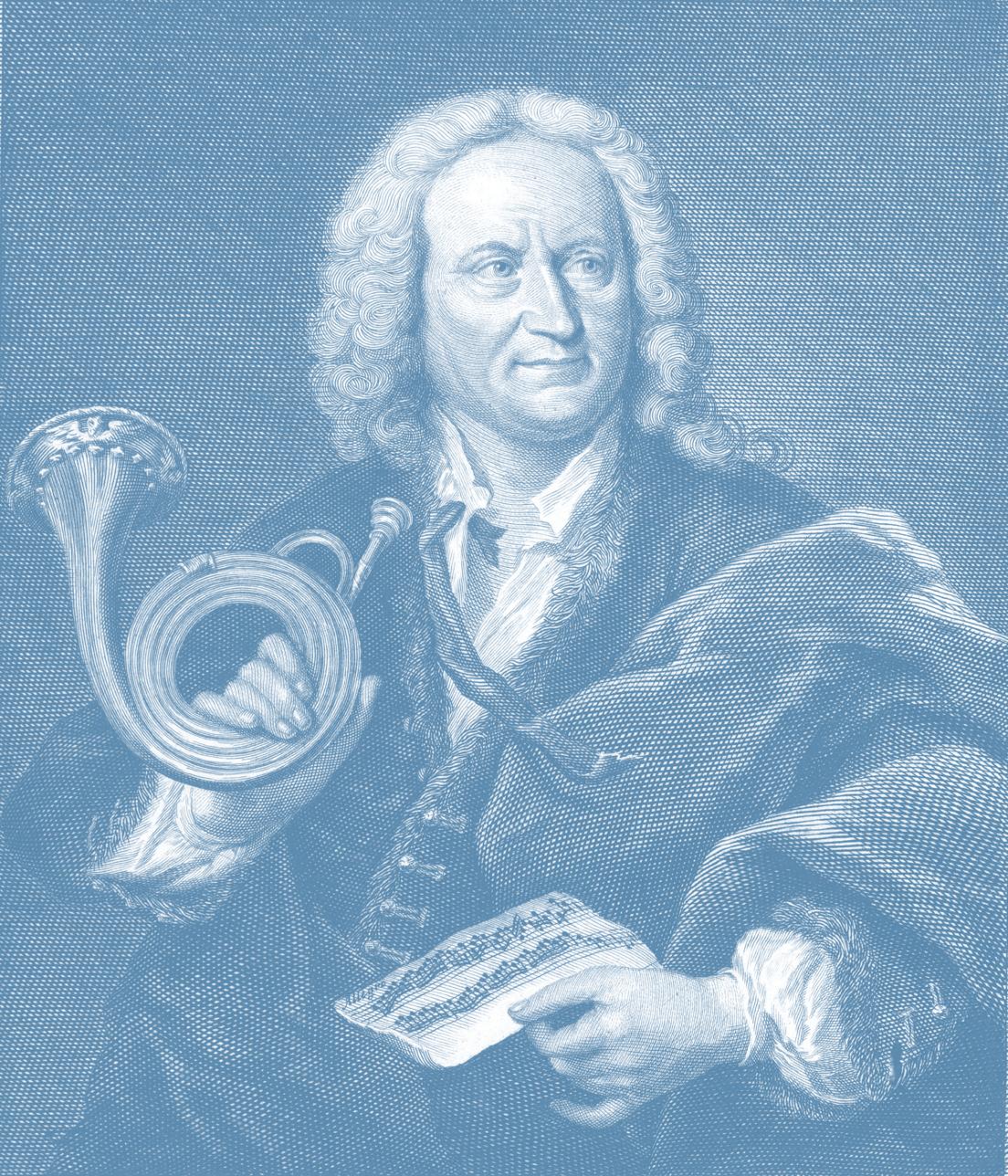

Johann Kuhnau (1660-1722): Sonata in C (3 trumpets, sackbut, timpani, 2 oboes and organ)
Heinrich Ignaz von Biber (1644-1704): Sonata a 7 (3 trumpets, sackbut, timpani, 2 oboes and organ)
Heinrich Ignaz von Biber (1644-1704): Tam aris quam aulis n. 10 (trumpet, 2 oboes, sackbut and organ)
Gottfried FInger (1660-1730): Sonata in C n. 1 (trumpet, oboe and organ)
Pavel Josef Vejvanovsky: Sonata in g minor (trumpet, 2 oboes, sackbut and organ)
Dietrich Buxtehude (1637-1707): Canzonetta BuxWV169 (organ)
Johann Sebastian Bach (1685-1750): Dona nobis pacem BWV 232 (3 trumpets, timpani, 2 oboes, sackbut and organ)
Johann Sebastian Bach (1685-1750): Sinfonia BWV 249 (3 trumpets, timpani, 2 oboes, sackbut and organ)
Johann Sebastian Bach (1685-1750): Vater unser BWV 737 (organ)
Philipp Jakob Rittler (11637-1690): Ciaccona a 7 (2 trumpets, 2 oboes, sackbut, percussion and organ)
Heinrich Ignaz von Biber (1644-1704): Sonata Sancti Polycarpi (3 trumpets, timpani, 2 oboes, sackbut and organ)
Gottfried Reiche (1667-1734)
Work by Elias Gottlob Haußmann
Delightful Pocket Company
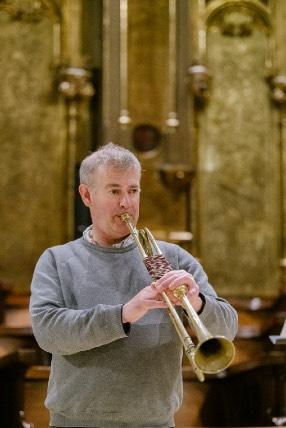
Robert Vanryne began playing the cornet by accident at the age of 9 when his older brother was given one to learn on his first day at his new school. After a year of being self-taught, his first lessons were with local musicians Steven Downie and the late (and much missed) Trevor Steventon with whom he learned cornet at the High Wycombe Music Centre under their scholarship scheme. After having progressed from the cornet to the trumpet, he reached the brass finals of the BBC Young Musician of the Year competition in 1980.
After having heard a recording of the Gavotte from the third D Major Orchestral Suite (J S Bach) during a school music lesson, he began to develop an interest in both Baroque music and the Baroque trumpet. Growing up in an engineering family it was inevitable that he, with his father, began to experiment with making their own copies of old instruments with guidance from his then teacher, Stephen Keavy. Several years later he had made copies of natural trumpets which were being used by many of the world’s leading period instrument specialists.

After a year of postgraduate study with Michael Laird at the Royal College of Music, he quickly fell into a career as a musician, specialising in period instrument performance with many of Europe’s leading ensembles including The Academy of Ancient Music, The Orchestra of the Age of Enlightenment, the English Baroque Soloists and the Orchestra Révolutionnaire et Romantique.
Robert is principal trumpet of the Netherlands Bach Society with whom he has been engaged in recording filmed performances of the complete works of Johann Sebastian Bach.
He continues to specialise in music from the Baroque era but has also recently become involved with the performance of 19th Century chamber music on early valved brass instruments.
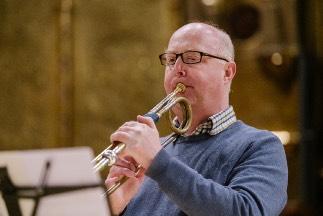
Renowned as one of the finest exponents of the valveless baroque trumpet and Principal Trumpet for some of the world’s greatest symphony orchestras, Neil Brough is respected for his inspired artistry and his considered approach to the historical performance of music.
Since 2022 he is the Principal Trumpet for the Chamber Orchestra of Europe, with whom he has recorded the full Beethoven Symphony cycle with Yannick Nézet-Séguin, just released on Deutsche Grammophon.
Principal Trumpet for Sir John Eliot Gardiner’s English Baroque Soloists and the Orchestre Révolutionnaire et Romantique, Neil has appeared as both a soloist and orchestral member/section leader throughout the UK, Europe and America.
Neil Brough’s performance of Bach’s second Brandenburg Concerto at the BBC Proms was hailed by The Independent as ‘Absolutely astonishing; high, accurate, effortless, awe inspiring’. An exponent of the lyrical clarino style of Baroque playing, Neil’s interpretation of solo works by Bach, Handel and Purcell led to extensive CD recordings with the English Baroque Soloists and performances at the Sydney Opera House
Delightful Pocket Company

with the Australian Chamber Orchestra, Vienna Musikverein and the Concertgebouw Amsterdam. Neil has completed critically acclaimed cycles of Berlioz and Beethoven with the Orchestre Révolutionnaire et Romantique with residencies in Europe and in Carnegie Hall, New York.
Personally appointed by Sir András Schiff to play in the international chamber ensemble Cappella Andrea Barca, Neil has toured Europe and Asia performing the great masterpieces from Beethoven, Haydn, Mozart and Brahms in some of the most famous concert halls in the world.
Neil’s musical education began in Leicester, England with the renowned local music service. A full scholarship to the Royal College of Music followed and upon graduation he was appointed as a Professor.
In the UK Neil is the Principal Trumpet for the English Chamber Orchestra and performs as a guest Principal Trumpet with the London Symphony Orchestra, Philharmonia Orchestra, the Orchestra of the Royal Opera House and the Orchestra of the Age of Enlightenment, and his London studio work can be heard on the soundtracks of many blockbuster movies.
The Delightful Pocket Company is a chamber ensemble composed of organ, trumpet, and oboe; three instruments brought together by three musicians who share a passion for chamber music, who are deeply committed to refining their performances, and who are united by their pleasure in introducing composers and unique repertoires, all starting from a sound that is as genuine as it is familiar.
It is a group with historical origins and a specific original repertoire, but, due to its inherent idiosyncrasy and the unmanageable personality of its members, it thrives on the constant search for new artistic proposals based on two axes: on one hand, the search and performance of ancient music with historical instruments, and on the other, the recreation and their own adaptations of all kinds of music.
It was founded in 2020 and has performed at the Torroella de Montgrí Fringe Festival, in Barberà del Vallès and Montserrat, among others. During the 22-23 season, it was selected to be part of the Joventuts Musicals catalog as an emerging group.
On this occasion, the trio expands to eight members in its XL version. Therefore, we have initiated a collaboration with two of the most important figures in the interpretation of the Baroque trumpet today (members of the English Baroque Soloists and the Netherlands Bach Society, among others), who have seen in our young group the potential to create a chamber project that addresses the most complex and spectacular repertoire written for the Baroque trumpet.
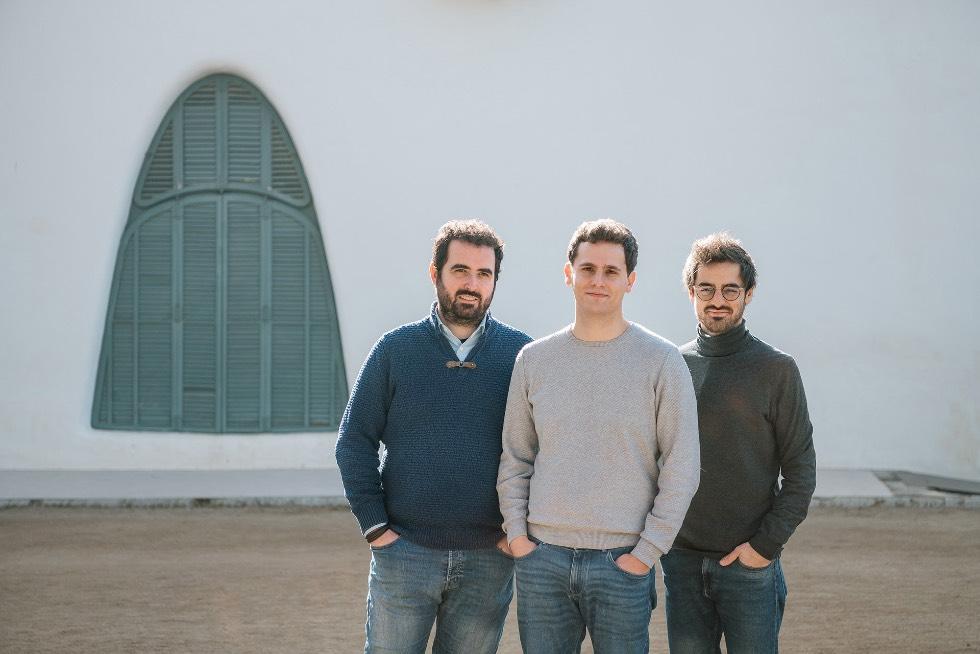
Born in Sant Joan de Vilatorrada, from 2003 to 2007, he was part of the Escolania de Montserrat and continued his training at the Municipal Conservatory of Manresa. In 2013, he was accepted into the ESMUC (Catalonia College of Music) where he studied classical trumpet with Mireia Farrés and chamber music with organists Óscar Candendo and Juan de la Rubia.
Driven by his interest in early music, he expanded his training by studying Baroque trumpet at the Conservatory of Novara (Italy) with Gabriele Cassone in
He regularly collaborates with the orchestras Vespres d’Arnadí, Orquestra Barroca Catalana, GIO Symphonia, Terrassa 48, Theresia Youth Orchestra, and Orquestra Barroca de Barcelona.
In 2020, together with Ivan Alcazo and Marc Díaz, he founded the chamber group The Delightful Pocket Company.

Since 2015, he has played Principal Trumpet for the
He is a trumpet teacher at the Taradell School of Music and the Manlleu Municipal School of Music.
He studies oboe at the ESMUC (Catalonia College of Music) specializing in classical and contemporary music and early music with professors Dolors Chiralt and

He continues his studies at the National Conservatory of Music and Dance in Paris with baroque oboe professor Michel Henry and chamber music with Keneth Weiss.
He has been a member of the Youth National Orchestra of Catalonia (JONC), the National Youth Orchestra of the Netherlands (NJO), and the Jeunne Orchestre Atlantique (JOA).
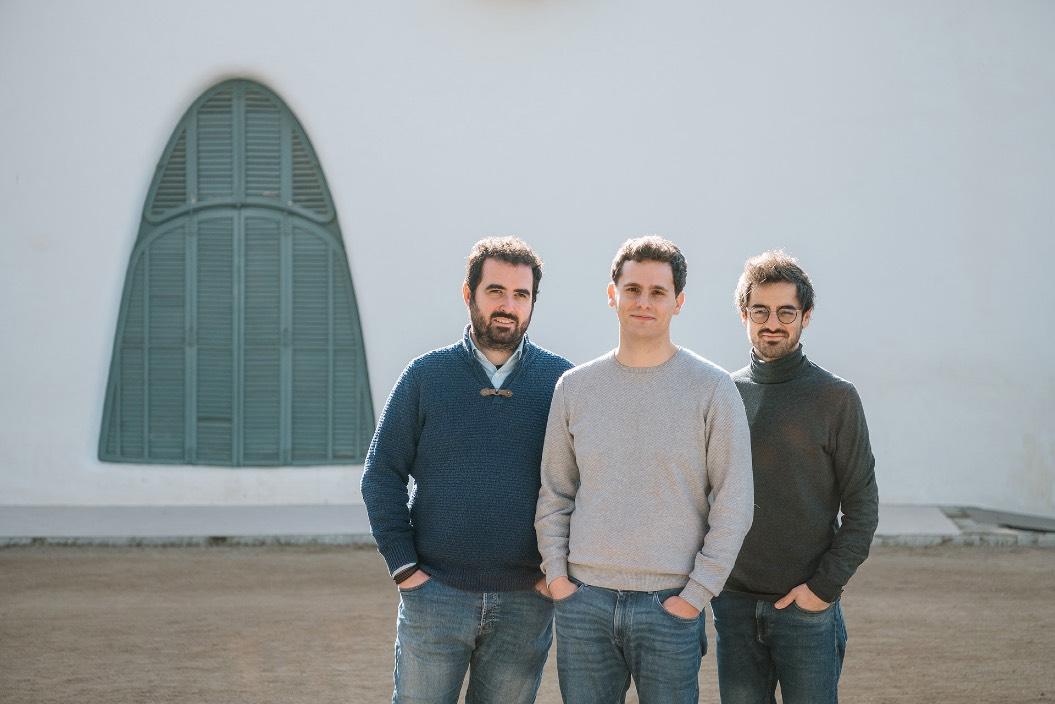
He regularly collaborates with various national and European orchestras, such as the Chamber Orchestra of Granollers, National Classical Orchestra of Andorra (ONCA), Barcelona Symphony and Catalonia National Orchestra (OBC), Bcn216 Instrumental Group, Orquestra Barroca Catalana, Finnish Baroque Orchestra, and Vespres d'Arnadí orchestra, among others.
At 9 years old, he joins the Montserrat Choir School, where he soon discovers and becomes particularly passionate about choral music, especially early music. There, he also studies cello, piano, and organ.
Currently, he develops this early passion especially in communion with his most personal projects: the Cor Cererols and the chamber instrumental group The Delightful Pocket Company.
As an organist, he collaborates with the main choirs, orchestras, and music festivals in the country, such as the OBC (Barcelona Symphony and Catalonia National Orchestra), the Orchestra of the Gran Teatre del Liceu, Vespres d’Arnadí, the Jove Capella Reial, Ensemble O vos omnes, the CJNC, or the Cambra Choir of the PMC. He has also worked as an organist and harpsichordist at the Teatre Lliure.
As a conductor, he also directs the GAC Choir, has worked as a choir preparer for the Bachcelona Festival and the Joven Coro de Andalucía, and collaborates with the Francesc Valls Choir.
He has studied choir conducting at ESMUC (Catalonia College of Music) and at KMH in Stockholm, where he completed his studies conducting the Radio Choir of Sweden in his Final Concert.
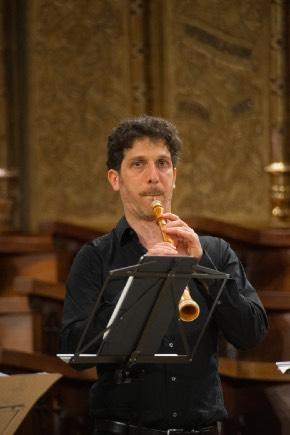
Born in 1979 in Tel-Aviv, Israel, he completes his higher education studies in oboe with Professor Dudu Carmel and composition with Mark Kopytman at the Jerusalem Academy of Music and Dance. Subsequently, he moves to Verona, Italy, to commence his studies in early music by attending various baroque and historical oboe courses, later culminating in the Bachelor Degree and Master's with Professor Paolo Grazzi at the "E.F. Dall’Abaco” Superior Conservatory in the same city.
After having been established in the cities of Milan and Barcelona, he currently resides in the city of Zaragoza, from where he has collaborated with various groups and orchestras worldwide.
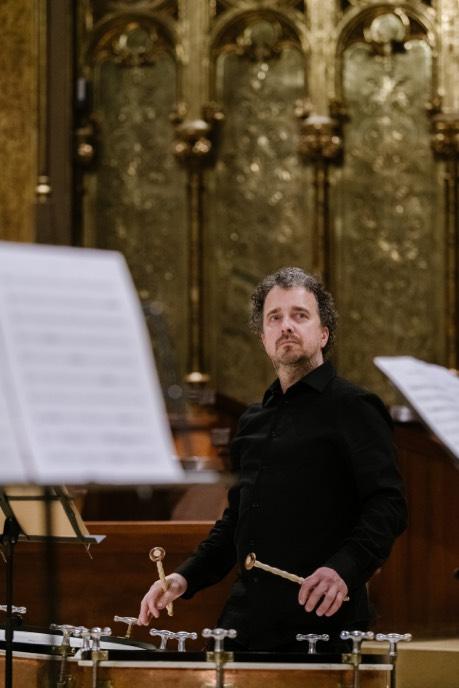
He regularly collaborates with the Jerusalem Baroque Orchestra, Ghislieri Consort, Copenhagen Soloists, Europa Galante, Academia Montis Regalis, and Concerto Italiano, as well as with the groups "Il Pomo d’Oro" and "Il Giardino Armonico" among others.
Born in Sant Feliu de Guíxols (Girona) in 1976, he has pursued studies in classical, modern, and traditional percussion at the Conservatori del Liceu and the Taller de Músics de Barcelona, as well as the Escola Superior de Música de Catalunya with Pedro Estevan, Jo Krause, Ramón Torramilans, and David Xirgu, among others. At the ESMUC (Catalonia College of Music), he obtained a Bachelor's degree in Jazz and Modern Music, specializing in Drums, in 2008, and a Master's degree in Musicology and Performance of Early Music, specializing in Historical Percussion, in 2013.
Attracted by multi-instrumentalism, and indiscriminately by ancient and classical music, jazz, improvised music, pop, and rock, he has collaborated in more than 100 recordings as a studio musician spanning all these styles and has carried out intensive interpretive work, performing at the main festivals and concert halls throughout Europe, North and South America, Russia, China, Japan, and South Korea.
He has worked with Jordi Savall, Hesperion XXI, La Capella Reial de Catalunya, and Le Concert des Nations (Àlia Vox), Chamber Orchestra of Teatre Lliure, Les Sacqueboutiers de Toulouse (FR), Baroque Orchestra Al Ayre Español, Orquestra Barroca Catalana, San Francisco Philharmonia Baroque Orchestra (USA), GIO Symphonia, Il Complesso Barroco (IT), Orquesta Barroca de Sevilla, Orquestra romàntica del Montsalvat, Orquestra Simfónica del Vallés, Orquestra de Cadaqués, La Caravaggia, Accademia del Piacere, Vespres d ´Arnadí (Musiepoca), Tercia Realidad, La Tempestad, Concerto Copenhagen (DK), Magdalena Kozena & Private Musicke, La Grande Chapelle, Orquestra de Cambra de Granollers (NAXOS), the Chamber Choirs of the Palau de la Música Catalana and the Auditori Enric Granados de Lleida, the theatre companies of Mario Gas and Dagoll Dagom, Nina, Percussions de Barcelona, Love of Lesbian (Warner), Jaume Sisa and Eduard Canimas (DiscMedi), The New Raemon, Joan Colomo and Nueva Vulcano (Bcore), etc…
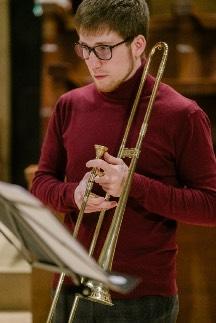
Born in Berga in 1996, he begins his musical training in the same city with the clarinet as his main instrument and, later, also starts studying the trombone. In 2014, he continues his training with both instruments at the Municipal Conservatory of Music in Barcelona, while graduating in Musicology at the Autonomous University of Barcelona.
Delightful Pocket Company
In 2019, he enters the ESMUC (Catalonia College of Music), and graduates in 2023, obtaining a Degree in the Interpretation of Classical and Contemporary Music, specializing in trombone, with Professor Daniel Perpiñán. At the same school, he takes sackbut lessons from Simeón Galduf and Jordi Giménez and has the opportunity to be part of various early music ensembles, directed by Lluís Coll and Francesc Garrigosa.
Currently, he is a trombonist for the Cobla Sant JordiCiutat de Barcelona and collaborates with groups such as the Cobla de Cambra de Catalunya, the Chamber Orchestra Terrassa 48, and the early music groups Dichos Diabolos and Sacabutxos de Barcelona.
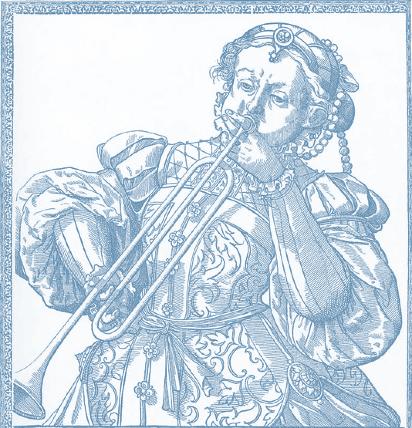
INSTRUMENTS - Baroque Continuo Organ or Church Organ (a=415Hz or 440Hz).
STAGE - Seven music stands and seven chairs.
LIGHTING - Seven music stand lights in rooms / churches with low lighting. One additional stand light for the organist.
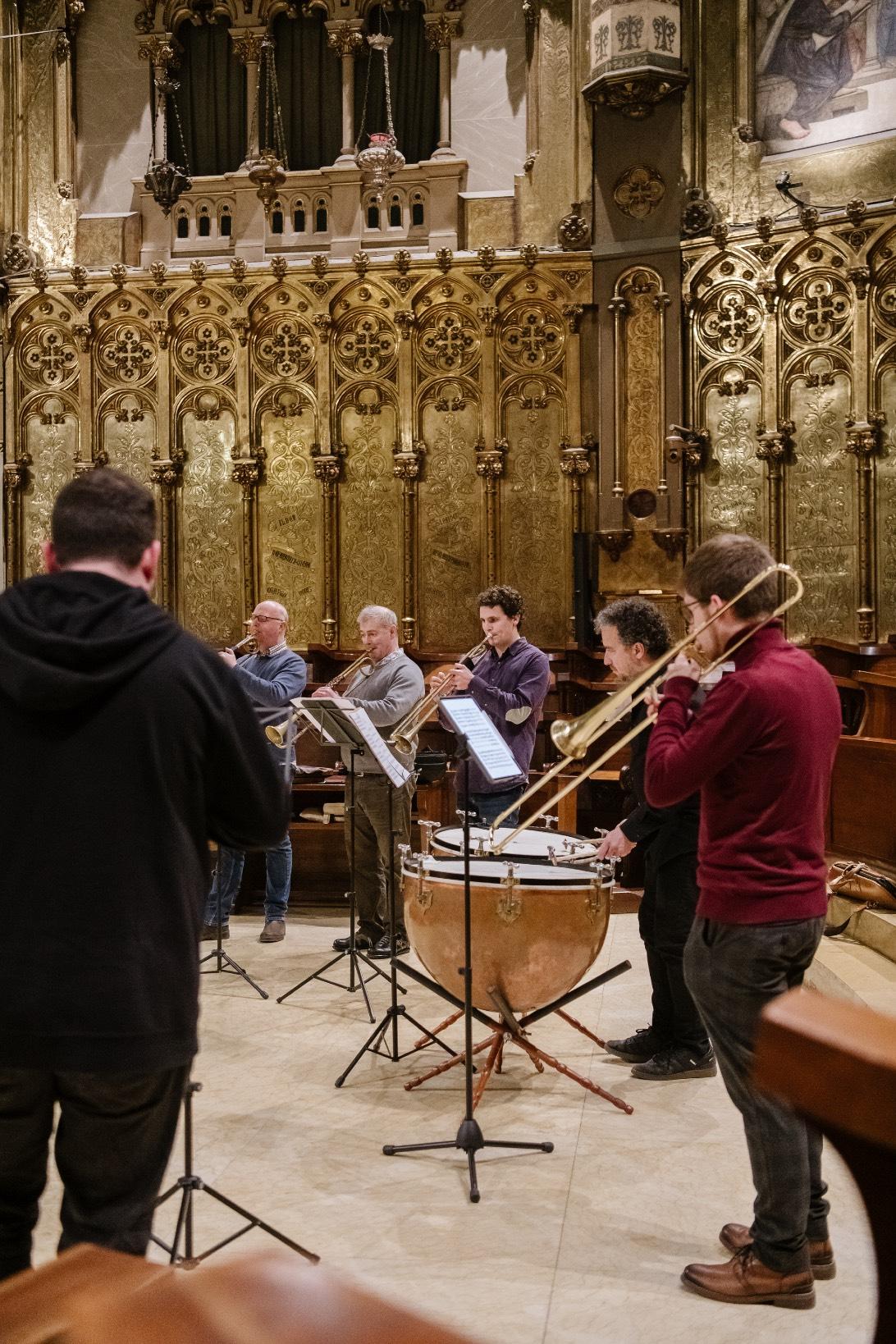

The Delightful Pocket Company